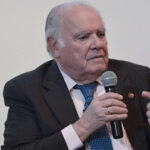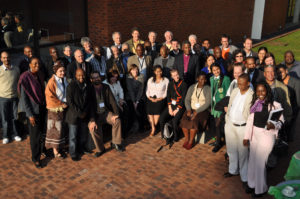World Leadership Alliance-Club de Madrid (WLA-CdM) organized a conversation together with the National Migration Institute in the Dominican Republic (INM-RD) to share the work of this institution in the Dominican Republic, which focuses on emphasizing the challenges that political leaders and the media must face in tackling migration.
Held under the title Migrations from an Inclusive Perspective: Political Leadership to Redefine Migration Discourses, this conversation took place on 29 October during a visit of INM-RD Director, Florinda Rojas, who is also a member of the NetPLUSS, a WLA-CdM’s network of experts.
“Hand in hand, we are defining good practices that can be exported to other countries”, said Florinda Rojas in her speech, commenting on the several missions that WLA-CdM has conducted in the Dominican Republic. These missions have contributed to bringing forward good practices from former Prime Ministers and Presidents, whose governments have put forward their own policy reforms.
Former Spanish Prime Minister José Luis Rodríguez Zapatero led a mission in 2017 to share his expertise and his personal experience overseeing the inclusion of immigrants in Spain. Laura Chinchilla, former President of Costa Rica, led a mission this year to share her recommendations and best practices from her experience leading Costa Rica’s government. Florinda Rojas also shared the work of the INMD-RD in the framework of the project Journalism and migration: Challenges and perspective in Dominican Society, which involves media professionals to explore alternative narratives in migration. As a result of the project, good practices of narratives which are respectful to the human rights of migrants were brought forward, practices which could be replicated in other countries.
Media professionals discuss more inclusive migration discourses
Enrique Valentín Iglesias, former President of the Inter-American Development Bank, and Honorary Member of the Club de Madrid highlighted the relevance of migration issues during his political and personal experience in Uruguay, and in different international organizations throughout his professional career.
The former Foreign Minister of Uruguay stated that he does not perceive the same aversion towards migrants in Latin America as he does in Europe or the United States.
The conversation also included presentations from media professionals and researchers, who reflected on their own experiences.
Beatriz Marín García, a media analyst and journalist, presented a study on misinformation related to migration, which served as a foundation during workshops held in the Dominican Republic.
Photographer César Deffuli also mentioned the complexity of photographing migration, as the resulting visual output will influence the way in which migrants will be perceived by society. In his work, César strives to give migrants a unique identity, instead of depicting them collectively.
Iman Moutaoukil, from Progestión Association, highlighted her organization’s work with migrants at the local level. She sees day-to-day coexistence with migrants as an opportunity to improve the narratives and discourse on the topic.
Violeta Velasco, research associate at the PorCausa Foundation, presented a complementary vision of migration as a natural and uncontrollable phenomenon. “People will continue to move as they have always done”, she said.
Migration must be treated as a positive phenomenon, believes Violeta. In order to construct alternative narratives about migration, the messages should not respond to the topics of the debate, but should respond to new narratives about migrants.
After the presentations, there was time for questions and comments. Different representatives of organizations, universities and migrant collectives contributed to the conversation discussing the role of the media, the migration crisis in Venezuela, the relevance of data in migration issues and messages posted on social networks.


